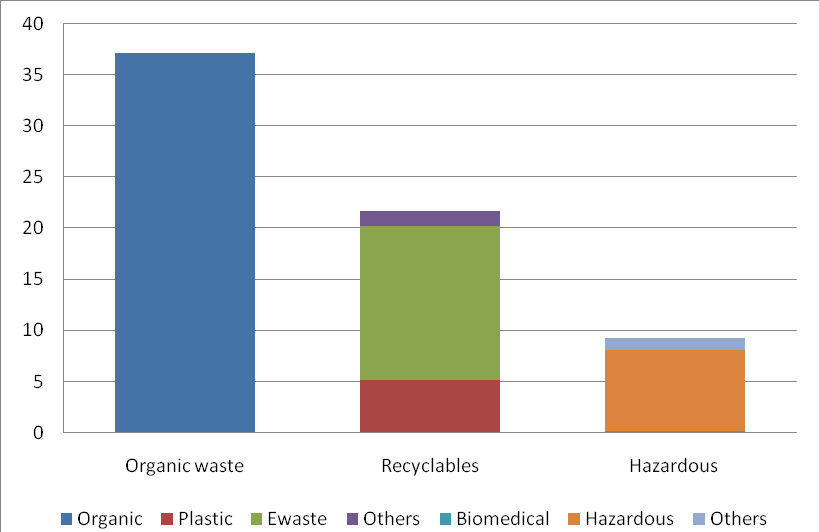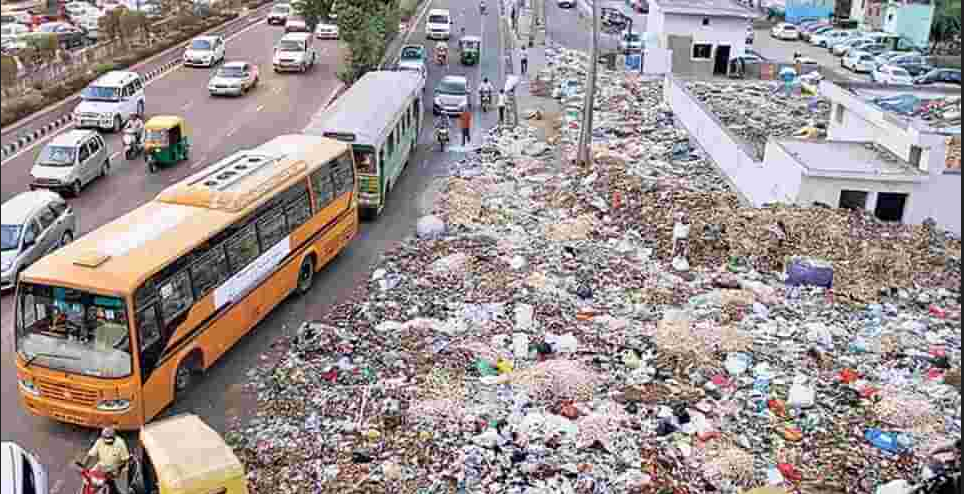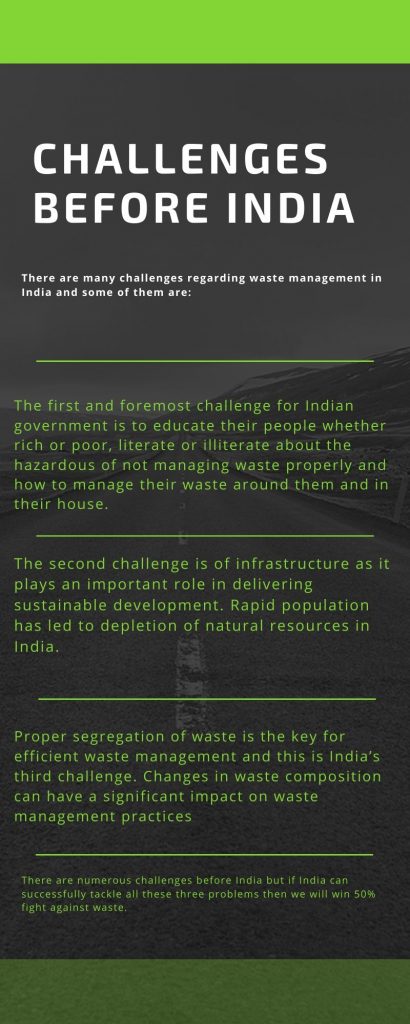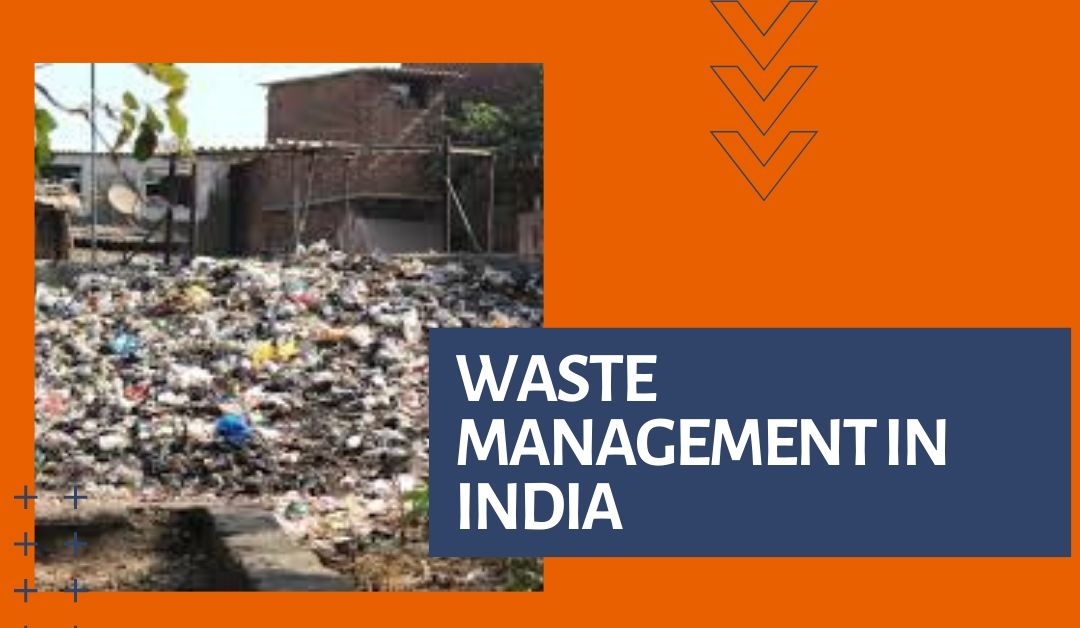Waste management ensures that the disposal process is carried out in an efficient and safe way. Now let’s talk about India.
Waste Management in India falls under the purview of MoEF&CC.
In 2016 this ministry released the solid wastage Management (SWM) Rules, 2016
These rules replaced the Municipal Solid Wastage Rules, 2000.
According to an estimation urban municipal solid waste generation will increase solid waste generation to 165 million tons by 2030.
Source of this information: Wikipedia
On 2nd October 2014 Prime minister of India Shri Narendra Modi launched a Clean India Mission, popularly known as, Swachh Bharat Abhiyan.
Content:
- Composition of Waste
- Laws regarding waste
- How is India drowning in waste
- Challenges
- Opportunities
- Conclusion
- FAQs
Composition of Waste
It should be noted that 62 million tons annually averages out to 450 grams of waste per person per day.
However, there is a lot of variability in per capita waste generation in India.
At this time daily household municipal waste generation ranges from 170 grams per person in small towns to 620 grams per person in large cities.

Out of which MSW composition in India is approximately:
- 40-60% compostable
- 30-50% inert and
- 10-30% recyclable.
According to the NEERI, Indian waste consists of 0.64%±0.8% nitrogen, 0.67%±0.15% phosphorus, and 0.68%±0.15% potassium (Source: Ascelibrary)
Laws Regarding Waste Management
It’s not like India don’t have any rules related to waste management.
There are many laws/rules and regulations regarding waste management in India.
The problem lies in implementing them as no one here cares about the rules because there is no penalty for breaking the rules.
So here are some major highlights of new SWM(Solid waste Management) rules, 2016.
- Firstly the new law mandates segregation at source.
Waste generators have to segregate waste into three streams –
- Organic or Biodegradable waste,
- Dry waste and
- Domestic Harmful waste (diapers, napkins, mosquito repellents etc.)
- Secondly, the manufacturers of the sanitary napkins are responsible for awareness of proper disposal of such waste by the generator.

They shall provide a pouch or wrapper for disposal of each napkin or diaper along with the packet of their sanitary product.
- In addition, municipalities and urban local bodies have been directed to include informal waste pickers or rag pickers into their waste management process.
This is the first time that national policy has acknowledged and included informal sector into the waste management process.
- Moreover, the new rules have given power to the local bodies across India to decide the user fees.
Municipal authorities will levy user fee for collection, disposal and processing from bulk generators.
Additionally spot fines may be levied on user’s burning garbage or throwing it in a public place.
- No non- recyclable waste having a calorific value of 1500 kg or more should be disposed in the landfills.
It should either utilize for generating energy or can be used for preparing refuse derived fuel.
- As per the rules, the Department of fertilizers, Ministry of Chemicals and Fertilizers should provide market development assistance.
And also ensure promotion of co-marketing of compost with chemical fertilizers.
How is India Drowning in Waste?
From my childhood till today while growing up I have seen that the children (including me) are told to throw the garbage not in the bin but on the road because it’s okay as long as you don’t keep the packet with you.
The proper education about waste, it’s hazardous affects if not managed properly are not taught to anyone in this country from the very beginning.
I believe that it is one of the most important factor of why India is drowning in garbage.

Reasons:
Now, some other reasons are as follows:
- When it comes to waste management in India, nothing is quite right.
CPCB in its report stated that 62 million tons of waste is produced in our country every year, of which less than 20% or only 12 million are treated.
This essentially means that remaining 80% remain untreated and contaminates our environment.
- As we all know that one of the largest landfill of the world is in our country’s capital.
This is one of the major issue-there is literally no space to accommodate fresh garbage waste.
The reason is that the current waste disposal system of India is flawed.
And the govt should concentrate on finding new innovative ways of disposal instead of constructing new landfills.
- As we all know that India is a diverse country.
In India there are 3000 main caste and 25000 sub caste and this caste system does two things:
- Firstly, it spreads the idea that managing waste is not theirs to do as there are a special category of people who will do it for them.
- Secondly it predisposes large number of people to the idea that tainted things need to be discard.
There are many more reasons of how and why is India drowning in garbage.
But there is only one solution and that is our government needs to make sure that:
- The waste management rules are strictly followed
- Take initiative to form public private alliance to curb this problem and make India a clean and prosperous country.
Challenges:
There are many challenges regarding waste management in India and some of them are:

- The first and foremost challenge for Indian government is to:
Educate their people whether rich or poor about the hazardous of not managing waste properly and how to manage their waste.
- The second challenge is of infrastructure as it plays an important role in delivering sustainable development.
Rapid population has led to depletion of natural resources in India.
Developing high quality infrastructure that meets the needs of the people and protects the environment.
- Proper segregation of waste is the key for efficient waste management and this is India’s third challenge.
Changes in waste composition can have a significant impact on waste management practices.
Hazardous, organic and bio-medical waste should not be mixed as they can produce greenhouse gases.
But it happens in India due to lack of proper management system.
There are numerous challenges before India but if India can successfully tackle all these three problems then we will win 50% fight against waste.
Opportunities:
There are challenges but opportunities also lies before us and they are:
By 2025, India’s waste management sector is expected to be worth US$ 13.62 billion with an annual growth rate of 7.17%.
Much of the waste India produces simply ends up in landfills without proper processing of treatment.
Redirecting this untapped waste to proper treatment and processing facilities will open up new investment possibilities.
A huge opportunity lies in front of start-ups to find innovative solution for proper waste management system.
With the planned creation of 100 smart cities in India, getting involved in effective waste management solutions will benefit both Indian and foreign companies & investors.
Conclusion
To sum up from the above discussion we can conclude that India should now take waste management seriously.
As the famous saying goes-
” A pessimist sees the difficulty in every opportunity; An optimist sees opportunity in every difficulty “
In short the point is no matter how much difficulties we face we should look up for the opportunities and make impossible happen.
Also read:
ANGER MANAGEMENT – THE UNBELIEVABLE 3 DISCUSSIONS
FAQ:
Ans: India generates approx. 62 million tones of waste every year.
Out of this only 20% of the waste gets treated due to which most of the waste either gets dumped in the landfill.
If now India do not take any step against this no one can help India getting out of this mess.
Ans: There are a lot of Institutes in India who offers specialized courses for waste management in India.
Some of them are:
1. Indian Institute of Technology (IIT) Delhi.
2. All India Institute of Hygiene and Public Health, Kolkata.
3. International Institute of Waste Management, Bangalore.
Ans: Yes, waste management can pick up community’s:
Electronics, paints, motor oil, garden chemicals and other hazardous household chemicals.
Ans: From my point of view clean places attract people.
It effects tourism in both positive and negative way.
If a place is clean and neat it attracts people. If not it refrains people from going there.
Ans: Waste effects environment in negative ways as:
1. Some waste can rot but not all and in the process it may smell.
2. It also produces green house gases which pollutes the environment adversely.
